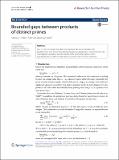| dc.contributor.author | Liu, Yang | |
| dc.contributor.author | Park, Peter S. | |
| dc.contributor.author | Song, Zhuo Qun | |
| dc.date.accessioned | 2018-04-09T14:04:30Z | |
| dc.date.available | 2018-04-09T14:04:30Z | |
| dc.date.issued | 2017-12 | |
| dc.date.submitted | 2016-07 | |
| dc.identifier.issn | 2363-9555 | |
| dc.identifier.uri | http://hdl.handle.net/1721.1/114616 | |
| dc.description.abstract | Let r ≥ 2 be an integer. We adapt the Maynard–Tao sieve to produce the asymptotically best-known bounded gaps between products of r distinct primes. Our result applies to positive-density subsets of the primes that satisfy certain equidistribution conditions. This improves on the work of Thorne and Sono. | en_US |
| dc.description.sponsorship | National Science Foundation (U.S.) (Grant DMS-1557960) | en_US |
| dc.publisher | Springer | en_US |
| dc.relation.isversionof | http://dx.doi.org/10.1007/s40993-017-0089-3 | en_US |
| dc.rights | Creative Commons Attribution | en_US |
| dc.rights.uri | http://creativecommons.org/licenses/by/4.0/ | en_US |
| dc.source | Springer International Publishing | en_US |
| dc.title | Bounded gaps between products of distinct primes | en_US |
| dc.type | Article | en_US |
| dc.identifier.citation | Liu, Yang et al. "Bounded gaps between products of distinct primes." Research in Number Theory 3 (December 2017): 26 © The Author(s) 2017 | en_US |
| dc.contributor.department | Massachusetts Institute of Technology. Department of Mathematics | |
| dc.contributor.mitauthor | Liu, Yang | |
| dc.relation.journal | Research in Number Theory | en_US |
| dc.eprint.version | Final published version | en_US |
| dc.type.uri | http://purl.org/eprint/type/JournalArticle | en_US |
| eprint.status | http://purl.org/eprint/status/PeerReviewed | en_US |
| dc.date.updated | 2017-12-01T04:54:07Z | |
| dc.language.rfc3066 | en | |
| dc.rights.holder | The Author(s) | |
| dspace.orderedauthors | Liu, Yang; Park, Peter S.; Song, Zhuo Qun | en_US |
| dspace.embargo.terms | N | en_US |
| mit.license | PUBLISHER_CC | en_US |
